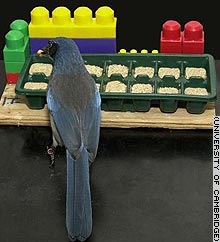|
|
Home | Asia | Europe | U.S. | World | Business | Tech | Science | Entertainment | Sport | Travel | Weather | Specials | Video | I-Reports |
|
|
|
Home | Asia | Europe | U.S. | World | Business | Tech | Science | Entertainment | Sport | Travel | Weather | Specials | Video | I-Reports |
|
Story Highlights• Western scrub jays are able to plan for future food shortages by caching food• Study shows birds can plan ahead in much the same way as people do • Biologists consider jays to be the most intelligent birds Adjust font size:
WASHINGTON (Reuters) -- Clever scrub jays can plan on saving tasty treats for the future and do it in a way that shows they are truly planning ahead, British researchers reported Wednesday. They set up a careful experiment to allow the birds to cache food in a certain way if they were indeed planning, and found the birds were up to the task. Their study, published in the journal Nature, adds to several others that show animals such as great apes and certain birds can plan ahead in much the same way as people do. "Knowledge of and planning for the future is a complex skill that is considered by many to be uniquely human," Nicola Clayton and colleagues at the University of Cambridge wrote. "We show that the jays make provision for a future need, both by preferentially caching food in a place in which they have learned that they will be hungry the following morning and by differentially storing a particular food in a place in which that type of food will not be available the next morning," they added. In the complicated experiment, the jays were kept in large cages with two rooms. They were moved from one compartment to another depending on the time of day. They also got different types of food -- ground-up pine nuts, which they could not store, and peanuts and dog kibble, which they could. Scrub jays love all three. First they fed the birds on a schedule, with breakfast being served in one compartment but not the other. Then they threw the birds off this schedule by unexpectedly feeding them in the evening. The birds stored more food if they got this surprise evening meal in the compartment where they usually were not fed than if they got the night treat in the "breakfast room," Clayton's team reported. Planning aheadIn a second experiment, the birds got breakfast in both rooms but peanuts only in one and dog kibble only in the other. Then they got a chance to hide both types of food anywhere they liked. They hid dog food in the peanut compartment and vice-versa, the researchers saw. "The results described here suggest that the jays can spontaneously plan for tomorrow without reference to their current motivational state, thereby challenging the idea that this is a uniquely human ability," Clayton's team argued. Sara Shettleworth of the University of Toronto in Canada agreed. "Two requirements for genuine future planning are that the behavior involved should be a novel action, or combination of actions (thus ruling out migrating and hibernating), and that it should be appropriate to a motivational state other than the one the animal is in at that moment," she wrote. So the animals must not be acting out of immediate hunger, for instance. She said Clayton's experiment was the first to unambiguously fulfill both requirements. Last May, a team led by Joanna Dally of the University of Cambridge reported that scrub jays could remember which other birds were watching them when they first hid some treats, and change the hiding places if there was a chance the other birds could steal the food. Jays are members of a group of birds called corvids, which include crows, jays and ravens. Biologists consider them to be the most intelligent birds. Also last May, Nicholas Mulcahy and Josep Call of the Max Planck Institute for Evolutionary Anthropology in Leipzig, Germany, tested bonobos, close relatives of chimpanzees, and orangutans at the local zoo and found the animals could plan and use tools. Copyright 2007 Reuters. All rights reserved.This material may not be published, broadcast, rewritten, or redistributed. 
Experiments at the University of Cambridge show that birds are able to plan for future food shortages by caching food. |